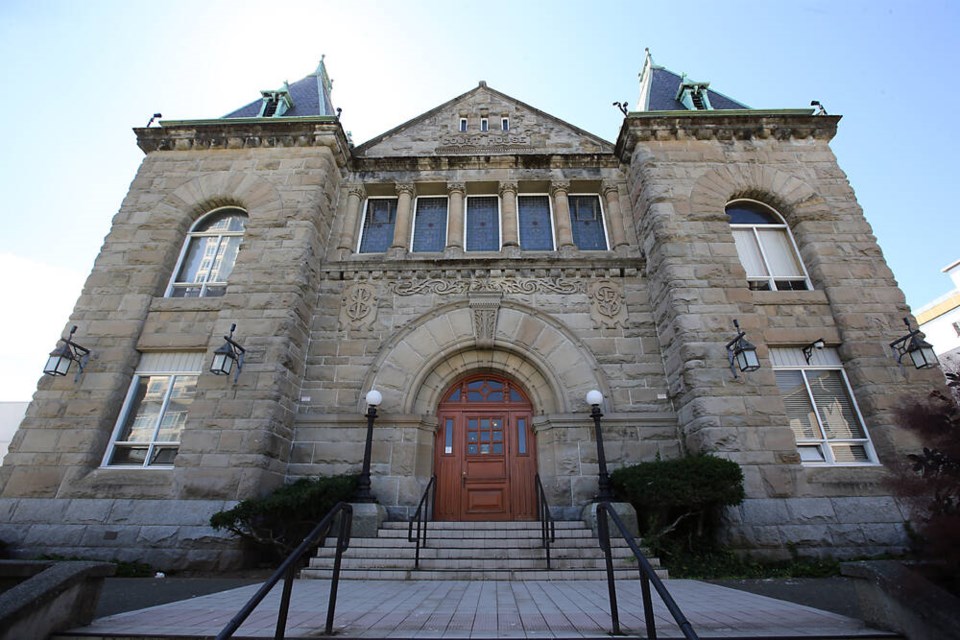A judge has ruled that the transfer of a Nanaimo house to a family member for $1 by a man who owed more than $400,000 in damages constituted a “fraudulent conveyance.”
Fraudulent conveyance is a term used for efforts to delay or defraud creditors of lawful remedies.
Jian He was awarded $447,450 in damages after a civil trial against Hai Huang for an August 2013 assault.
The day after the verdict, Jian He’s lawyer discovered that the house at 6626 Dover Rd. belonging to Hai Huang and Ying Gao had been transferred during the civil litigation process for $1 to their son Tian Long Huang.
The house was valued at $485,000 at the time, the decision said. It is currently assessed at more than $980,000.
The transfer took place after the civil assault case was filed and before a verdict was rendered.
“I conclude that, if there had ever been any doubt about it, Mr. Huang was on clear notice by mid-July 2016, three months before the transfer, that the allegations made in the plaintiff’s lawsuit were serious and that, if things did not go his way, he would be obliged to pay the plaintiff a significant sum of money in damages,” B.C. Supreme Court Justice Robin Baird said in his April 9 decision.
Although the 2016 house transfer stands, Jian He is allowed to register a judgment against the property and act on it, Baird said.
That gives Jian He the ability to collect on the damages award.
The court received medical records indicating Jian He had a perforated eardrum that required surgery after the assault, and that he suffered from depression and post-traumatic stress disorder that his doctor attributed to the incident.
Huang admitted he struck Jian He and damaged his eardrum, but said he acted in self-defence. Huang denied causing any psychological injury to Jian He.
Jian He was unable to work because of his injuries and did not earn an income for more than two years, according to documents submitted to the court.
No money has been paid towards the award. Huang told the court he has not worked since 2014, when he was in his mid-50s, and said he has no assets, the decision said.
Huang and Gao said they are totally financially dependent on their son, who pays for their living expenses and costs related to the house, Baird said.
All three have lived in the house for 20 years and plan to continue doing so.
Huang and Gao said the house was transferred to Tian Long Huang for legitimate reasons.
At the time of the transfer, Tian Long Huang was engaged to be married. They said that Chinese custom required his parents to transfer their property to him prior to the wedding to show the woman and her family that she would be adequately looked after.
They also said that it is Chinese custom for children to continue living with their parents after marriage and to take on responsibility for family costs, look after their parents in their old age and eventually receive the parents’ property in compensation.
Because Hai Huang and Gao could not afford to maintain the house and because their son agreed to pay all the costs and allow them to stay in the house, they felt it only fair to transfer the title to him, court was told.
In the end, the marriage between Tian Long Huang and a young woman from Chengdu, China, did not happen. Tian Huang remains single.
His is the only name on title for the house.
Baird said he had nothing to go by in this case except the uncorroborated testimony of the defendants concerning their intentions.
After weighing their evidence, he said, “I have decided that it falls well short of rebutting the presumption that the transfer was fraudulent.”
Even if he accepted there was some legitimate estate-planning in this case, the goals of Hai Huang and Gao could have been met by a transfer allowing their son to be a joint tenant of the property, with the right to survivorship, Baird said.
“The fact that, instead, they divested themselves of the property altogether speaks clearly to an alternative intention.”
The house transfer had deprived Jian He from being able to register the damages judgment against the property’s title.
“The presumption is strong that the transfer was intended to put the property out of the plaintiff’s reach,” Baird said.
“The timing of it, in the very midst of civil litigation in which it had been clearly established by medical evidence that Mr. Huang stood exposed to significant financial liability to the plaintiff, is extremely suspicious.”
Baird said he was not convinced by the uncorroborated claim that it is Chinese custom for parents to transfer all their assets to their children, “especially when the parents are comparatively young and profess, for reasons not disclosed, to earn no income to support themselves.”



